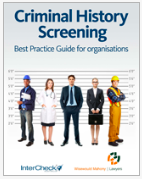
Have you ever run criminal history checks on future or current staff members hoping to not find anything – but then you did? Being prepared in these situations will make life easier for your organisation.
Criminal history checks can reveal any pending criminal charges against a person, or any prior convictions that can be disclosed by the law. These are often referred to as “disclosable court outcomes”.
The minute you come across any such disclosable court outcomes or pending charges, it is important for you to stop and take the following measures
Talk to them.
Like with any strong relationship, communication is key. The manager in charge of the criminal history check must let the employee, or job applicant, know what they’ve found. If this information is wrong, or if the person has no idea why such a record has popped up, this gives them the chance to rectify the record or challenge any outcomes they think are inaccurate. Remember, this step is not only fair, but also mandatory!
Talk to them some more.
If you’ve already advised your employee about the disclosable court outcomes you stumbled upon as a result of conducting a police check, and they admit that they do, in fact, have this prior conviction. This was not some glitch in the system. What do you do then?
Communication is still the key. Give them the chance to explain themselves. Try to have a frank conversation and keep an open mind. This could very well be a conviction from while ago – but that does not make them dangerous or unsuited to this role, or moreover, a threat to your organisation.
That, of course, takes us to the next question. How do you decide whether a criminal record is relevant or something you should just ignore?

Follow protocol.
Prior to embarking on a pre-employment background check, make sure your organisation creates a formal policy stating the assessment criteria to determine when someone’s criminal record would be relevant.
In doing so, it’s important to consider the following:
- Whether the criminal record has any connection or significance to the employee’s role, and whether it is necessary or fair to remove them from the position based on this conviction;
- Whether the criminal record is recent or from a period that falls outside the scope for assessment;
- Whether the offence was a one-off instance or has been repeated -indicating an overall tendency to break the law;
- Whether the court outcome or sentence was serious (requiring jail time, for instance), or minor (where the person only had to do a few weeks of community service with no recorded conviction);
- Whether the employee has a plausible explanation for why this criminal record exists;
- Whether the employee has been with your organisation for a long time, and how they have behaved during that time;
- Whether the employee poses a threat to the organisation or welfare of other staff members;
- Whether there are any relevant laws you need to consider that protects individuals with this type of prior convictions.
Consult with senior management.
While this step is optional and depends on the size and structure of your organisation, it can sometimes be beneficial to discuss this matter with senior management before making that final decision. There could be legal consequences if you conduct a police check and dismiss someone for the wrong reason so it’s always best to keep yourself covered against any future litigation.
The most important thing to remember is that you should never fire a staff member as soon as, and just because, you discover a criminal history record. You could end up facing allegations of unfair dismissal and discrimination – with both legal and reputation consequences. Make sure you communicate with the employee, openly and honestly, and you carefully assess the relevance of their conviction to their ability to do their job.
Does an employee in your organisation have a criminal record? Download our Criminal History Screening Best Practice Guide and safeguard your company against any employment related risks.








